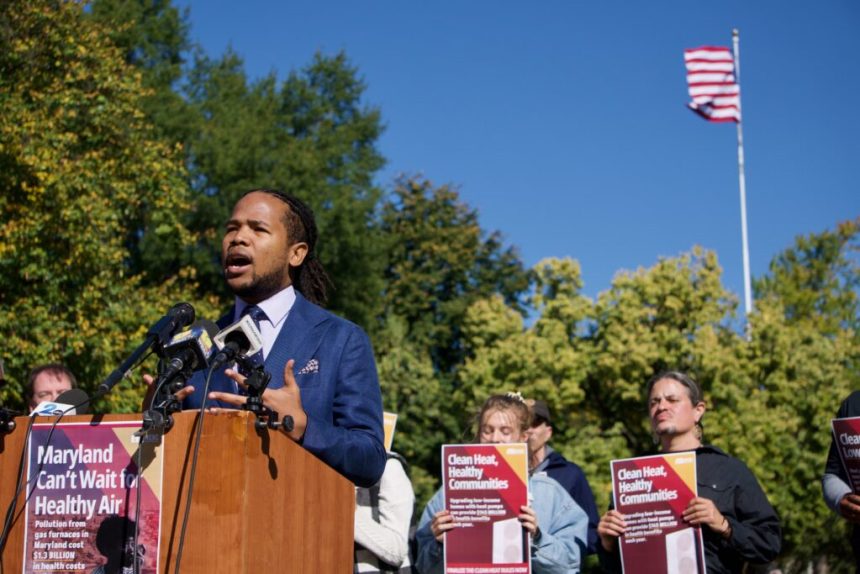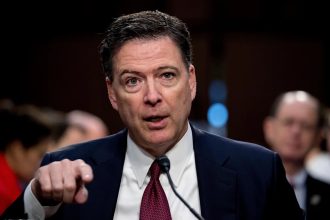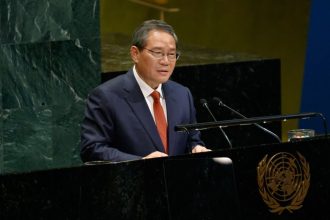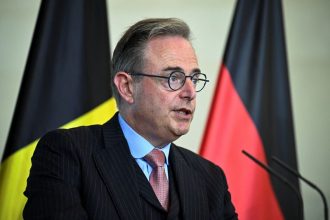Del. Gabriel Acevero (D-Montgomery) speaks at a news conference Thursday in Baltimore where a coalition of environmental and community health advocates said the state needs to move faster to advance a Clean Heat Standard for residential heating equipment. (Photo by Christine Condon/Maryland Matters)
A group of Maryland environmental advocates is pushing the state to hasten its development of rules that would bolster electric heating systems inside homes, including heat pumps.
Under a June 2024 executive order from Gov. Wes Moore (D), the state must establish Clean Heat Rules, aimed at reducing air pollution from fossil fuel-burning heating equipment.
State officials said they are progressing toward meeting the goal. But advocates said Thursday they want to see more urgency from the state’s Department of the Environment.
“While the transition to heat pumps is happening, it’s not happening fast enough to meet our climate commitments,” said Anne Havemann, general counsel at the Chesapeake Climate Action Network. “It’s also not happening equally across income brackets. Right now, it’s mostly higher-income Marylanders who are making the switch.”
That’s what brought a number of nonprofit groups to Baltimore’s Patterson Park on Thursday, to announce formation of the Maryland Clean Heat Coalition to push for the change. The groups — including the Green & Healthy Homes Initiative, the Sierra Club’s Maryland chapter and Interfaith Power and Light of the DMV, among others — are planning to launch a $200,000 digital advertising campaign focused on the benefits of transitioning to all-electric heating.
They were joined by Del. Gabriel Acevero (D-Montgomery), who said that electrifying more heating equipment in residential buildings could help prevent explosions tied to natural gas pipes.
A 2016 explosion in a Silver Spring apartment building killed 7 people and injured dozens more, and was attributed to a buildup of natural gas from an unconnected vent line, according to the National Transportation Safety Board.
“We need to ensure that we are not just avoiding instances like that, but providing alternative clean energy solutions right here in the state of Maryland,” Acevero said. “But also, more importantly, ensuring that my constituents, Marylanders, have affordable energy and their bills do not continue to skyrocket, which is what we’re seeing today.”
Eventually, the standards would require property owners to transition end-of-life furnaces and boilers to electric alternatives — a policy that could hit low-income ratepayers hard, according to a new analysis from the Sierra Club Maryland Chapter and the Center for Progressive Reform.
The rule could mean that 14,000 space heating units and up to 22,000 water heaters a year in low-income Maryland households need to be replaced with heat pumps, the study said. It would cost $185 million more than in-kind replacements.
But the switch is expected to save low-income ratepayers money in the long-run. The study suggests that the energy bill savings would reach $350 million per year (in 2024 dollars) by 2050.
There would also be positive health impacts, advocates say. A 2023 study from GHHI estimated that pollution from fossil fuel heating systems was costing $1.3 billion in health costs annually in Maryland, because it contributes to respiratory issues and asthma
It comes as high electric bills continue to raise an outcry — and attract attention from Maryland legislators. This past legislative session, lawmakers voted to give ratepayers two bill credits, worth an avearage $40 bill each, in addition to longer-term measures that fast-track certain energy storage and generation projects through the Maryland Public Service Commission.
The state is also under pressure to meet its ambitious climate goals, which will require an increasing number of buildings and homes to go electric. The state has set a goal of reducing its carbon emissions 60% below 2006 levels by 2031 and achieving net-zero emissions by 2045.
Per Moore’s 2024 order, MDE actually must issue two clean heat regulations. The agency declined to comment on the coalition’s demands, pointing to a webpage about the standards under development.
One is called the Zero-Emissions Heating Equipment Standard, which will set emissions standards for newly manufactured residential-scale furnaces, boilers and water heaters.
SUPPORT: YOU MAKE OUR WORK POSSIBLE
The other is the Clean Heat Standard, that will set requirements for heating fuel providers, such as pipeline gas utilities and fuel oil/propane delivery companies, to lower their emissions over time by delivering cleaner fuels, installing electric equipment or weatherizing buildings, according to the MDE website.
A timeline from the department indicates that the state plans to adopt the Zero-Emissions Heating rule some time in 2026, with the standard taking effect in 2029. The timeline calls for adoption of a rule to set a credit system for the Clean Heat Standard in 2026. For now, MDE has proposed reporting requirements for fuel delivery companies, which would take effect next year.
GHHI President and CEO Ruth Ann Norton said the federal government’s recent efforts to pull back funding and tax credits for clean energy projects shows that the ball is in Maryland’s court to advance policy change more rapidly.
“It’s on the state. It’s on us to be doing this. It’s on the governor to lead this,” Norton said. “We strongly feel that adopting these standards as quickly as possible means that people will be healthier sooner.”









